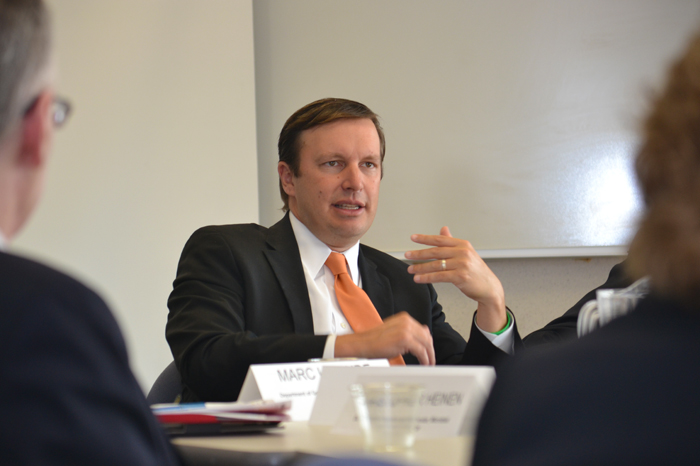
The effects of sequestration and National Institutes of Health (NIH) funding cuts were the focus of a roundtable discussion involving U.S. Sen. Chris Murphy and more than a dozen UConn Health Center researchers Wednesday.

Murphy serves on the Health, Education, Labor, and Pensions Committee and came to the Health Center to hear first-hand how the across-the-board spending cuts to federal agencies, including the NIH, are impacting future medical advances.
During this fiscal year, 157 NIH grants were awarded to 103 different principle investigators at the Health Center, totaling $51.7 million in funding.
Some of the studies include a personalized medicine approach to treating late-stage breast cancers, discovering new targets to repair tissues damaged by stroke or heart attacks, and uncovering the basis of inflammation in human disease.
Marc Lalande, senior associate dean for research planning and coordination, told Murphy that if sequestration continues and there is another 5 to 6 percent cut in funding in FY14, that could mean millions of dollars cut and potential workforce reductions.

“It’s important to remember that dollars lost are people lost,” said Dr. Frank M. Torti, the Health Center’s executive vice president for health affairs and dean of the UConn School of Medicine.
Dr. David Steffens, the chair of the psychiatry department, does clinical translational research focused on cognitive decline and dementia in the older population. He told Murphy continued cuts could mean fewer research assistants to help conduct neuro-imaging exams – a vital component of his research – which could seriously impact the scope of his studies.
Along with workforce reductions, there is a concern the cuts will discourage young scientists from entering the field.
Dr. David Rowe, professor of reconstructive sciences at the dental school, described how his daughter is now a freshman at UConn but wonders what the future holds for students like her. While STEM (science, technology, engineering and math) curriculum is being strongly encouraged in primary and secondary education, there seems to be a break in the pipeline when they reach the graduate level and begin their careers.

Because of the decrease in funding, young scientists are now competing against established investigators for grant money.
Another concern that was discussed is the fear of losing America’s edge in scientific research.
Dr. Cato T. Laurencin, head of the Connecticut Institute for Clinical and Translational Science, pointed out that China has increased its research spending by 15 percent over the past year while the United States has decreased its spending by 5 percent. “We’re in a watershed period now in terms of global competitiveness and if we don’t change this track, we will talk about this in 10 years that this was the changing point.”
“We are already in a crisis,” said Dr. Bruce Liang, director of the Calhoun Cardiology Center. “If you look at the number of drugs in the pipeline, new technology, we’re down. We have to reverse that. We’re already paying for the lack of investment.”
Follow the UConn Health Center on Facebook, Twitter and YouTube.


